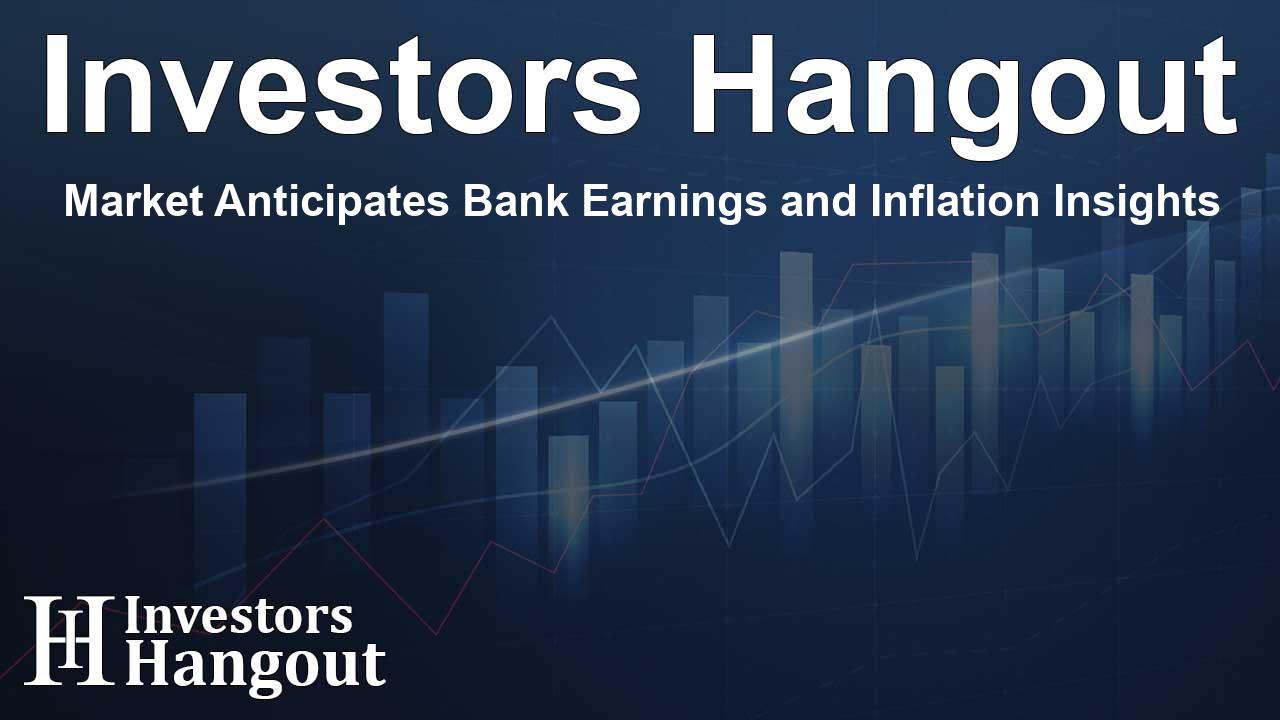Market Anticipates Bank Earnings and Inflation Insights

Market Sentiment as Major Earnings Approach
As Wall Street prepares for a pivotal week ahead, futures traded with little movement while investors remained watchful, anticipating earnings reports from some of the largest banks and crucial inflation statistics. This suspense is palpable as traders look for signs that could guide stock valuations in a market already characterized by elevated prices.
At the start of the day, Dow E-minis were up by 35 points, reflecting a slight uptick of 0.08%. Meanwhile, E-minis for the S&P 500 and Nasdaq 100 showed modest gains as well, with a rise of 3 points and 23.75 points respectively. These figures suggest that while there’s caution in the air, there’s also a glimmer of optimism.
Banking Sector in the Spotlight
Market players are closely scrutinizing the upcoming earnings reports from significant players like JPMorgan Chase & Co, Wells Fargo, Citigroup, and Goldman Sachs, all of which are expected to release their results shortly before the market opens. Analysts have remained optimistic, predicting robust earnings bolstered by vigorous trading and deal-making activities.
The Banks Index, which tracks the performance of major financial institutions, has already recorded an impressive gain of around 3% this month, positioning itself ahead of other major indexes. Looking back at the previous year, the banking sector experienced a remarkable resurgence, largely influenced by favorable market conditions and policy changes. The anticipated policies from incoming leadership, including potential tax reductions, have added a bullish sentiment to the financial landscape.
Valuations and Economic Indicators
However, despite the optimism, the S&P 500 has reached valuation levels significantly above its long-term averages, creating an air of caution among traders. A disappointing earnings report from these financial giants could challenge the recent wave of bullish behavior in equities.
Investors are also keenly awaiting the consumer price index (CPI), scheduled for release in the morning. Forecasted to rise to 2.9% in December, up from the prior month's 2.7%, this data point will be crucial. Economists are also watching the core CPI closely, which is projected to see an increase of 3.3%. This information is essential for understanding pricing pressures in the economy.
The Fed's Potential Moves and Market Reactions
The release of the CPI is considered vital, especially following a strong employment report from the previous week. Analysts are particularly attentive to how this could affect the bond market, which is bracing for potential volatility in the days to come.
Expectations around the U.S. Federal Reserve's rate-setting strategy are also in flux. Current trader data suggests that the market anticipates 31.2 basis points in rate cuts this year, with investors eager to see the central bank’s beige book of economic activity released later in the day to glean more insights into economic health.
Adding to the market's unease is the stabilization of long-term Treasury yields, which remain elevated near levels not seen in over a year, suggesting that inflation expectations may remain persistent.
Key Takeaways from Market Movements
In the world of equities, not all stock performances have been positive. For instance, Applied Digital recorded a downturn of 4.7% following a disappointing quarterly loss, illustrating the varied fortunes of different sectors.
Frequently Asked Questions
What are investors looking for in upcoming bank earnings?
Investors are anticipating strong earnings driven by increased trading and deal-making activities from major banks.
How has the bank sector performed recently?
The Banks Index has gained approximately 3% this month, showing stronger performance than other major indexes.
What impact will the CPI have on the market?
The CPI is critical as it offers insights into inflation, influencing Federal Reserve policy and market sentiment.
What is the role of the Federal Reserve in these dynamics?
The Federal Reserve's policies on interest rates and inflation management play a crucial role in shaping market expectations and conditions.
How do market valuations influence trading strategies?
High valuations can lead to cautious trading, as investors weigh potential risks against the likelihood of continued price increases.
About Investors Hangout
Investors Hangout is a leading online stock forum for financial discussion and learning, offering a wide range of free tools and resources. It draws in traders of all levels, who exchange market knowledge, investigate trading tactics, and keep an eye on industry developments in real time. Featuring financial articles, stock message boards, quotes, charts, company profiles, and live news updates. Through cooperative learning and a wealth of informational resources, it helps users from novices creating their first portfolios to experts honing their techniques. Join Investors Hangout today: https://investorshangout.com/
Disclaimer: The content of this article is solely for general informational purposes only; it does not represent legal, financial, or investment advice. Investors Hangout does not offer financial advice; the author is not a licensed financial advisor. Consult a qualified advisor before making any financial or investment decisions based on this article. The author's interpretation of publicly available data shapes the opinions presented here; as a result, they should not be taken as advice to purchase, sell, or hold any securities mentioned or any other investments. The author does not guarantee the accuracy, completeness, or timeliness of any material, providing it "as is." Information and market conditions may change; past performance is not indicative of future outcomes. If any of the material offered here is inaccurate, please contact us for corrections.